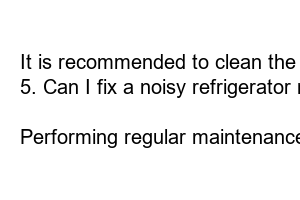냉장고 소음 원인
Title: The Noisy Fridge Conundrum: Exploring the Causes of Refrigerator Noise
Introduction:
It’s no secret that a refrigerator is an essential appliance in any household. However, when that once silent humming is replaced by strange noises, it can quickly become a nuisance. In this blog post, we will delve into the various reasons behind that unwanted noise, empowering you to troubleshoot and resolve the issue.
1. Loose Components:
If your refrigerator is emitting rattling or buzzing noises, the culprit may very well be loose components. These components could include the evaporator fan, fan blades, or the condenser fan. Tightening or securing these components can help silence the noise and restore serenity to your kitchen.
2. Damaged or Worn Out Fan Motor:
A worn-out or faulty fan motor can lead to a grinding, buzzing, or squealing sound. If you notice such noises, it’s time to inspect and, if necessary, replace the fan motor to restore tranquility to your kitchen.
3. Dirty Condenser Coils:
Accumulated dirt and debris on the condenser coils can cause the compressor to work harder and produce excessive noise. Regularly cleaning these coils will not only quieten your fridge but also enhance its efficiency, reducing energy consumption.
4. Unbalanced Refrigerator:
An unbalanced refrigerator can produce a variety of noises, including rattling, banging, or even scraping sounds. Ensuring your refrigerator is properly leveled and adjusting the front legs of the appliance can resolve this issue effectively.
5. Refrigerant Flow Issues:
Any blockages or leaks in the refrigerant flow can result in a gurgling, hissing, or bubbling noise. When faced with this problem, calling a professional technician is the best course of action to detect and fix the refrigerant flow issue.
6. Faulty Compressor:
A malfunctioning compressor can produce a loud humming noise that might gradually worsen over time. In such cases, seeking professional assistance becomes imperative to inspect and replace the defective compressor.
Summary:
In conclusion, noise emanating from your refrigerator can stem from various causes. Ensuring that all components are secure, maintaining cleanliness, and balancing the fridge are effective measures to tackle those unruly noises. While some issues can be resolved with simple DIY solutions, others require the expertise of a professional technician. By promptly addressing the cause of the noise, you can enjoy a peaceful and efficiently functioning refrigerator once again.
FAQs:
1. Why is my refrigerator making a clicking noise?
A clicking noise can indicate a faulty relay switch or compressor, requiring professional attention for repair or replacement.
2. What does it mean when my refrigerator is making a high-pitched sound?
A high-pitched sound may indicate issues with the motor or a defective fan, necessitating inspection and repairs.
3. Can a noisy refrigerator be harmful?
While not harmful, excessive noise from a refrigerator can be frustrating and disrupt the peaceful ambiance of your home.
4. How often should I clean my refrigerator coils?
It is recommended to clean the condenser coils at least twice a year to ensure optimal functioning and reduce unnecessary noise.
5. Can I fix a noisy refrigerator myself?
Certain issues, such as tightening loose components or leveling the appliance, can be resolved through simple DIY measures. However, for complex problems, seeking professional assistance is advisable.
6. How do I prevent refrigerator noise in the future?
Performing regular maintenance, keeping the appliance clean, and promptly addressing any emerging issues can help prevent future refrigerator noise.

